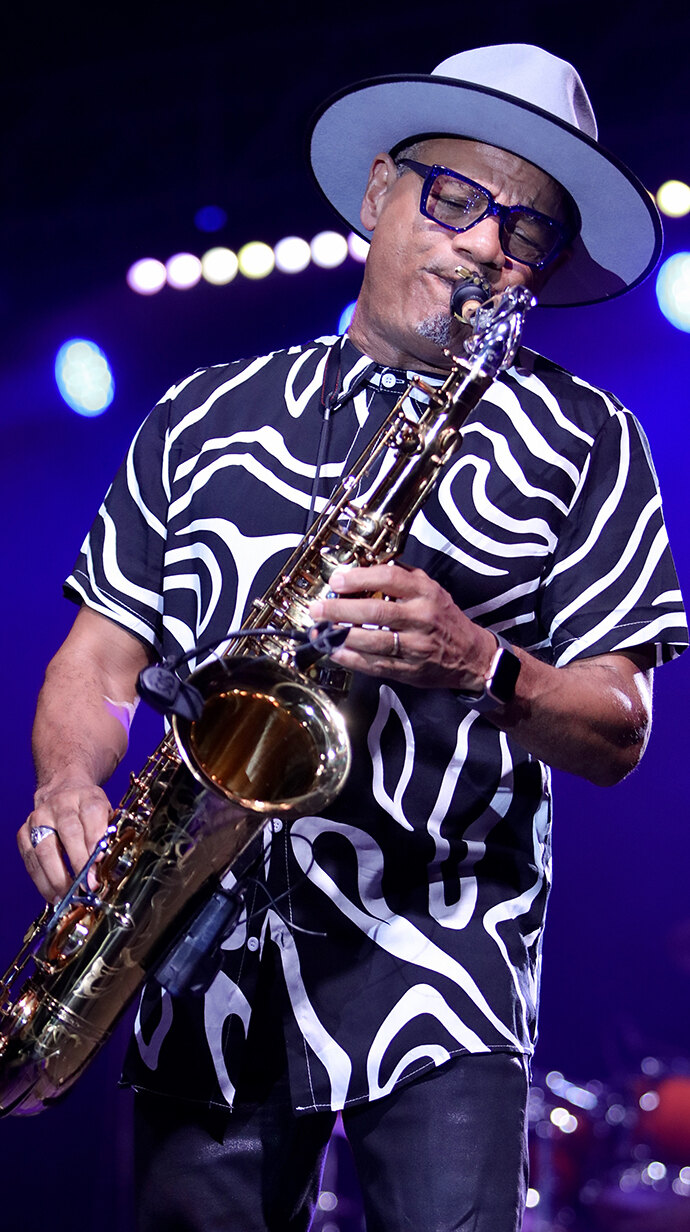Memphian jazz saxophonist among artists, speakers scheduled for Black History Month events

Saxophonist Kirk Whalum is set to perform for the university’s annual Black History Month Concert on Feb. 27 in the Gertrude C. Ford Center for the Performing Arts. Submitted photo
FEBRUARY 5, 2024
Grammy-winning saxophonist Kirk Whalum is coming to the University of Mississippi as part of Black History Month events scheduled during February.
The Memphis jazz and gospel performer is the guest artist for the annual BHM concert at 7:30 p.m. Feb. 27 in the Gertrude C. Ford Center for the Performing Arts. The UM Mississippians Jazz Ensemble, Gospel Choir, and the Ole Miss African Drum and Dance Ensemble will also perform during the show.
The concert and other BHM events are free and open to the public.
“Mr. Whalum will give a free workshop on the same day from 12:15 to 1 p.m. in the Nutt Auditorium,” said George Worlasi Kwazi Dor, professor of music and leader of the African Drum and Dance Ensemble. “His presence and skills are certain to be enjoyed by those in attendance.”

Brian Foster is scheduled to deliver the keynote address for Black History Month on Feb. 13 in the Paul B. Johnson Commons Ballroom. Submitted photo
Brian Foster, associate professor of sociology at the University of Virginia, will deliver the BHM keynote address at 6 p.m. Feb. 13 in the Paul B. Johnson Commons Ballroom.
Foster’s “Ghosts of Segregation: American Racism, Hidden in Plain Sight” (Celadon Books, 2024) is a collection of stories that together show the importance of seeing the environment – buildings we enter, roads we travel, things we are surrounded by – as part of the nation’s collective biography and as a signifier of what our future might be. From this perspective, Foster talks about his life’s work as a storyteller, sociologist and archivist of Black life in the South.
The Center for the Study of Southern Culture has back-to-back BHM events scheduled the first week of February. Speakers Yaphet Smith and Annalise Flynn will discuss “The Creative Legacy of the Unusual Artist Ms. L.V. Hull” at 4 p.m. Feb. 6. And DeLisa Hawkes will talk about “Into the ‘Glades: Zora Neale Hurston and African American Indigenization” at noon Feb. 7. Both events are slated for Barnard Observatory.
“In the spirit of Black History Month, we invite you to learn about L.V. Hull, a Kosciusko artist whose innovation and creativity inspired Smith and Flynn to work together on the preservation of Hull’s legacy,” said Afton Thomas, associate director for programs at the center. “Hawkes will engage with Zora Neale Hurston’s works through literary reflections on the relationships between the land and its peoples.
“Through an analysis of her creative and ethnographic work, Hawkes argues that Hurston presents African American and Native futures as inextricably intersecting based on their respective experiences with colonialist violence.”
The Black Student Union‘s 11th annual BHM gala is set for 6:30 p.m. Feb. 16 in The Inn at Ole Miss Ballroom. The theme of this year’s gala is “Embracing Excellence, Celebrating Culture: Unveiling the Black Renaissance.” Attire is formal/semi-formal. Attendees are asked to RSVP by 5:30 p.m. Monday (Feb. 5).
The College of Liberal Arts will host an Inclusion, Diversity, Equity Advancing Scholarship, or IDEAS, event at 4 p.m. Feb. 27 in the Ole Miss Student Union Ballroom. Kirk Johnson, professor of sociology and African American Studies, will present a lecture on “Keeping Our Eyes on the Prize: What If We Filmed a Landmark Civil Rights Documentary in 2024?”
Johnson worked on the 1989 PBS documentary “Eyes on the Prize: America’s Civil Rights Years, 1954-1985,” which won a dozen major film prizes, including six Emmy Awards.